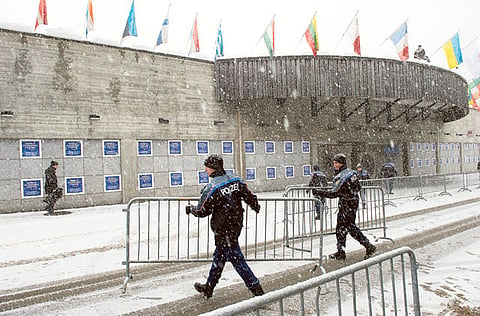Davos summit to focus on handling risk
The theme of the Annual Meeting is ‘resilient dynamism’

The world is still fragile as it recovers from the global crash, and efforts to rebuild business confidence and restore growth remain vulnerable to continuing economic and political shocks. But the urge to avoid risk and act with excessive caution would be a disaster for the world’s economy.
This is why this week’s 2013 Annual Meeting of the World Economic Forum in Davos will concentrate on how to encourage leaders from the public and private sectors to be ready to handle risk, so that they can encourage dynamic growth.
The theme of the Annual Meeting is “resilient dynamism”, which is designed to encourage organisations to be successful in both harnessing strategic agility as well as to possess risk resilience. The idea is to accept that change and unexpected events are inevitable, but successful organisations have to be ready to handle whatever comes. So risks have to be evaluated carefully so that it can be coped with, and the organisation must be able to rethink its strategy quickly as required by events.
As Klaus Schwab, executive chairman of the World Economic Forum has put it: “For over 40 years, the mission of the World Economic Forum — committed to improving the state of the world — has driven the design and development of the Annual Meeting programme. The Annual Meeting remains the foremost creative force for engaging leaders in collaborative activities focused on shaping the global, regional and industry agendas.
“Today, we live in the most complex, interdependent and interconnected era in human history. We are increasingly confronted by major adaptive challenges as well as profound transformational opportunities. This new leadership context requires successful organisations to master strategic agility and to build risk resilience.”
Search for growth
High on the agenda this year is how to get the global economy back onto a path of stable growth and lower unemployment, which has a particular resonance to delegates from the Arab world as they wrestle with the debilitating economic effects of their revolutions and their failure to kick start effective economic policies.
In the regions of the world, there is considerable uncertainty with leadership transitions in many G20 members (such as China, the US, and Germany) which have serious geopolitical and economic implications. Adding to this are the political transformations in Europe, the Middle East and North Africa which are causing huge changes in the world.
While focusing on growth and building dynamic economies, there will also be debate on how to avoid the threat of protectionism and nationalism which could easily derail economic integration and multilateral economic cooperation in many parts of the world.
In turn, global competitiveness will force companies around the world to nurture talent and innovation, in order to stay ahead of the competition. Several sessions will look at how to work on this while also creating new value as generational and structural shifts have a major impact on continually reshaping business models.



